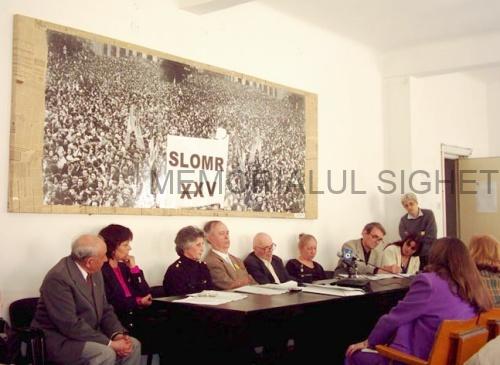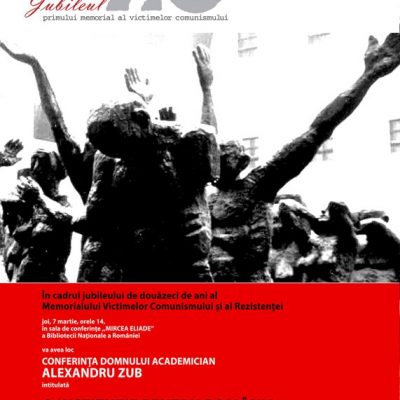
Civic Academy organized Friday, 30 April 2004, a documentary debate referring to the Free Union of Romanian Workers, established 25 years ago by Dr. Ionel Cana and by a group of intellectuals and workers. Two years after the suppression of the miners strike in Jiu Valley and the movement started by the writer Paul Goma, S.L.O.M.R. broadcasted a programme of demands within the country and succeeded in gathering over 2000 adhesion signatures from very diverse environments and geographical areas, remaining a symbol of Romanians’ attempt of opposing the monopoly of the totalitarian state. The speakers: doctor Ionel Cana, worker Vasile Paraschiv, Gratiana Popescu (sister of unionist Carmen Popescu) and Mara Stefan evoked the moments of the union’s setting up and its dissolution by the Security of State, through dismissals, arrests, sentencing and expulsions. Engineer Gerhard Nikolaus Kneip described in a letter sent from Germany how S.L.O.M.R. was set up in Timisoara. Cicerone Ionitoiu, dr. Ion Vianu and Victor Frunza talked about the echo of the union within the country and abroad, and the special role in the unification of the movement that was played by the broadcasts of “Free Europe”. Dr. Ionel Cana – who owns an impressive collection of the union’s archive – presented examples of records from the broadcasts.
Through this discussion (that enjoyed a touching atmosphere), Civic Academy completes the series of recent history moments, evoked in the presence of its protagonists, at the headquarters in Bucharest and at the Sighet Memorial (namely the meetings in Brasov in 1987, the demonstrations of intellectuals and workers in the 70’ and 80’). Ana Blandiana, the moderator of the discussion shown the continuity of anti-communist resistance that, after years of murderous repression during the Dej regime, faced less taught but more perfidious obstacles during the “golden era” and still succeeded in creating discontent among workers, which erodated and compromised the definition of the “the proletariat dictatorship” and the real socialism, until its collapse in 1989.
Academia Civică întregeşte prin această discuţie (care s-a bucurat de o atmosferă emoţionantă) seria momentelor de istorie recentă, evocate în prezenţa protagoniştilor, la sediul din Bucureşti şi la Memorialul din Sighet (mişcările de la Braşov din 1987, mişcările contestatare ale intelectualilor şi muncitorilor din anii ’70-’80). Ana Blandiana, moderatoarea discuţiei, a arătat continuitatea rezistenţei anticomuniste care, după anii de reprimare sângeroasă din timpul regimului Dej, a întâmpinat în „epoca de aur” obstacole mai puţin dure, dar mai perfide, reuşind totuşi să aducă în scenă de data aceasta nemulţumiţi inclusiv din rândul muncitorimii, ceea ce a erodat şi compromis definiţia „dictaturii proletariatului” şi socialismul real, până la colapsul din 1989.





